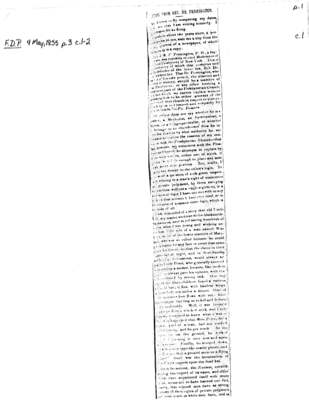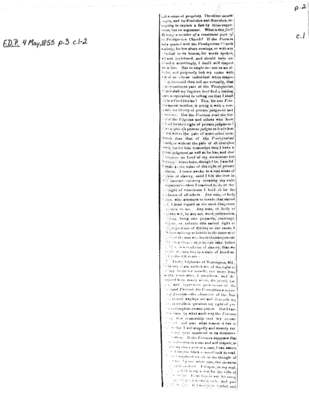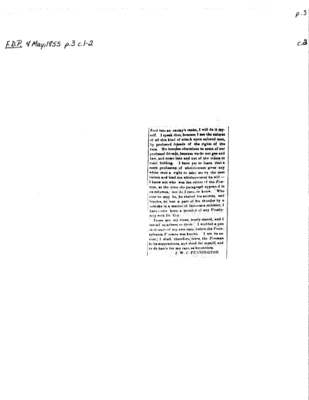Pages
D6778_Page_1
LETTER FROM REV. DR. PENNINGTON.
MR. EDITOR:—By comparing my dates, you will see that I am writing leisurely. I have a reason for so doing.
Somewhere about two years since, a person unknown to me, sent me a slip from the printed columns of a newspaper, of which the following is a copy:
"Rev. J. W. C. Pennington, D. D., a fugitive slave, was recently elected Moderator of the Third Presbytery of New York. This is the Presbytery of which that pompous and windy defender of the lower law, Rev. Dr. Cox, is a member. That Dr. Pennington, who has felt in his own person, the miseries and horrors of slavery, should be a member of that Presbytery, or any other forming a constituent part of the Presbyterian Church, is a fact which we cannot explain without him to be either ignorant of the position of that church in respect to slavery, or lacking in self respect and sympathy for them in bonds."—Pa. Freeman.
The editor does not say whether he is a Quaker, a Methodist, an Episcopalina, a Baptist, or a Congregrationalist, or whether he belongs to no church—nor does he inform his readers by what authority he undertakes to explain the reasons of my connexion with the Presbyterian Church—that fact, however, my connexion with the Presbyterian Church, he attempts to explain by three suppositions, either one of which, if proven, would be enough to place any man in an unenviable position. But, really, I cannot but demur to the editor's logic. To dispose of a question of such grave importance, relating to a man's right of conscience and private judgment, by three sweeping suppositions, without a single argument, is a specimen of logic I have not met with in any book on that science I have ever read, or in the volume of common sense logic, which is the best of all.
I am reminded of a story that Old Uncle Taff, my master workman at the blacksmithing business, used to tell among hundreds of others, when I was young and working under him. He told of a man named Wise Peter, in one of the lower counties of Maryland, who was so called because he could give a reason for any fact or event that came under his notice, so that the slaves in their quarterings at night, and in their Sunday and holiday discussions, would always appeal to Uncle Peter, who generally succeeded in settling a matter, because, like modern judges, he always gave his opinion, with reassons sustained by strong talk. one day some of the slave children found a curious species of bat; it flies with hairless wings while its body resembles a mouse. One of those creatures had flown with such force against an out building as to kill and deform itself considerably. Well, it was brough into the yard on a crooked stick, and Uncle Peter was consulted to know what it was.— Well, it so happened that Wise Peter, tho' a knowing kind of a man, had not studied natural history, and he got stuck. As the creature lay on the ground, he walked around it, turning it over now and again with his cane. Finally, he stooped down, and with a very sage-like nearer glance, said, "Well, it is either a ground mole or a flying squirrel." Such as the termination of Wise Peter's inquest upon the dead bat.
But, to be serious, the Freeman, notwithstanding the import of its name, and altho' it may have acquainted itself with many things, seems not to have learned one fact, namely, that colored men have as strong jealousy of their rights of private judgment and conscience as white men have, and as
D6778_Page_2
high a sense of propriety. The editor mends his pen, and he flourishes and flourishes, attempting to explain a fact by three suppositions, but no argument. What is this fact? My being a member of a constituent part of the Presbyterian Church? If the Freeman had a quarrel with the Presbyterian Church as a body, for her short comings, or with any individual in its bosom, for words spoken, and acts performed, and should have expressed it accordingly, I could still respect the motive. But to single me out as an offender, and purposely link my name with that of an odious individual white man— falsely, too—and then tell me virtually, that in no constituent part of the Presbyterian Church shall my fugitive heel find a resting place, is equivalent to telling me that I shall not be a Presbyterian! This, for one Freeman against another, is going it with a vengenance for liberty of private judgment and conscience. Has the Freeman read the history of the Pilgrims and others who have suffered for their right of private judgment? If my neighbor's private judgment leads him to rest within the pale of some other communion than that of the Presbyterian Church, or without the pale of all churches —well, but let him remember that I have a private judgment as well as he has, and that I recognize no Lord of my conscience but God only. Slave born, though I be, I am fully awake to the value of the right of private judgment. I never awoke to a real sense of the curse of slavery, until I felt the iron in my conscience—slavery invading my right of conscience—then I resolved to do or die. The right of conscience I hold to be the foundation of all others. Any man, or body of men, who attempts to invade that sacred right, I must regard as the most dangerous of all men to me. Any man, or body of men, who will, by an act, word, insinuation, or saying, bring into jeopardy, contempt, disrepute, or ridicule this sacred right of mine, on pretence of fidelity to our cause, I look upon as being as hostile to the interest of my race, as the man who binds chains upon our limbs, on pretence that he can take better care of us in a condition of slavery, than we can take of ourselves in a state of freedom. What is the difference?
Col. Frisby Tilghman, of Washington, Md., for twenty years, robbed me of the right to use my limbs for myself; and more than twenty years after, I overthrew, and denounced with manly scorn, the proud, rascally, and oppressive pretensions of the Maryland Pharaoh, the Pennsylvania inquisitorial Freeman—the Amalekite of the Northern Desert, waylays me and demands me passport—calls in question my right of progress to complete emancipation. But I have yet to learn by what authority the Freeman set up this censorship over my private judgment—and also what reason it has to suppose that I will stupidly and meanly surrender my inner manhood to its domineering dictation. If the Freeman suppose that I have not common sense and self-respect, to cling to my own rights as a man, I can assure it that is has one black covered book to read. My inner manhood recoils at the thought of being made, by one white man, the occasion of a fling at another. I despise, in my soul, the thought of being a rest for the rifle of sharp shooters. In an honest war, let every man load, steady his own muzzle, and pull his own trigger. If I wish to be loaded, and
D6778_Page_3
fired into an enemy's ranks, I will do it myself. I speak thus, because I see the animus of all this kind of attack upon colored men, by professed friends of the rights of the race. We become obnoxious to some of our professed friends, because we do not gee and haw, and come into and out of the traces at their bidding. I have yet to learn that a mere profession of abolitionism gives any white man a right to take me by the coat button and lead me whithersoever he will.— I know not who was the editor of the Freeman, at the time the paragraph appeared in its columns, nor do I care to know. Who ever he may be, he shared his animus, and besides, he lost a part of his thunder by a mistake in a matter of fact—as a minister, I have never been a member of any Presbytery with Dr. Cox.
These are my views, freely stated, and I intend to adhere to them. I wielded a pen in defence of my own race, before the Pennsylvania Freeman was known. I am its senior; I shall, therefore, leave the Freeman to its suppositions, and think for myself, and to do battle for my race, as heretofore.
J. W. C. PENNINGTON.


